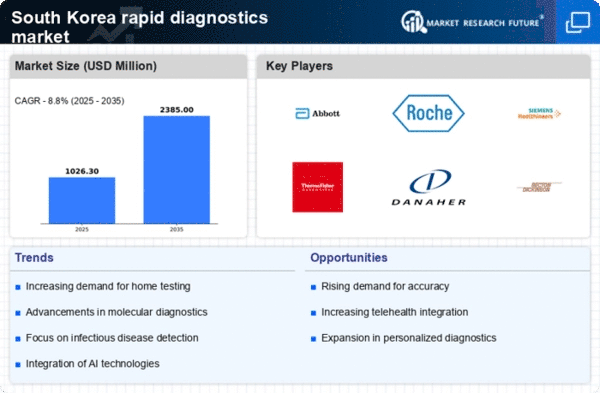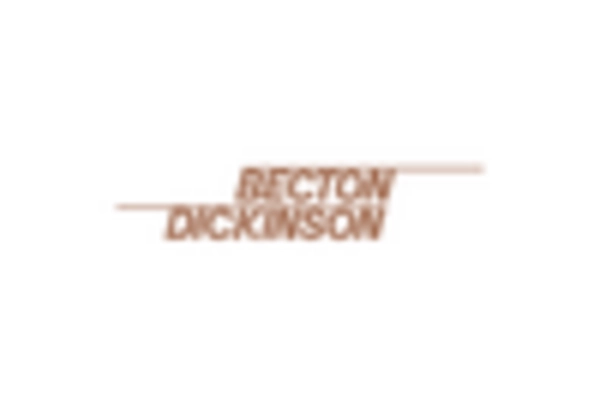Rising Prevalence of Chronic Diseases
The increasing incidence of chronic diseases in South Korea is a pivotal driver for the rapid diagnostics market. As the population ages, conditions such as diabetes, cardiovascular diseases, and respiratory disorders are becoming more prevalent. This trend necessitates timely and accurate diagnostic solutions to manage these health issues effectively. The rapid diagnostics market is responding to this demand by developing innovative testing methods that provide quick results, enabling healthcare providers to make informed decisions. According to recent data, the market for chronic disease diagnostics is projected to grow at a CAGR of approximately 8% over the next five years, highlighting the urgent need for rapid testing solutions in clinical settings.
Growing Focus on Preventive Healthcare
There is a notable shift towards preventive healthcare in South Korea, which is significantly influencing the rapid diagnostics market. This paradigm shift emphasizes early detection and management of diseases, thereby reducing healthcare costs and improving patient outcomes. The rapid diagnostics market is adapting to this trend by offering tests that can be conducted at home or in point-of-care settings, facilitating immediate access to health information. As a result, the demand for rapid testing solutions is expected to rise, with market analysts estimating a growth rate of around 10% annually in the preventive diagnostics segment. This focus on prevention is likely to reshape healthcare delivery in the coming years.
Technological Innovations in Diagnostic Tools
Technological advancements are transforming the landscape of the rapid diagnostics market. Innovations such as microfluidics, biosensors, and artificial intelligence are enhancing the accuracy and speed of diagnostic tests. These technologies enable the development of portable and user-friendly devices that can deliver results in real-time. The rapid diagnostics market is witnessing a surge in the adoption of these advanced tools, which are increasingly being integrated into healthcare systems across South Korea. Market data indicates that the segment for technologically advanced diagnostic tools is expected to grow by 15% over the next few years, driven by the demand for efficient and reliable testing solutions.
Increased Investment in Healthcare Infrastructure
The South Korean government is making substantial investments in healthcare infrastructure, which is positively impacting the rapid diagnostics market. Enhanced funding for healthcare facilities and research initiatives is facilitating the development and distribution of rapid diagnostic tests. This investment is crucial for improving access to healthcare services, particularly in rural areas where traditional diagnostic methods may be less accessible. The rapid diagnostics market is likely to benefit from these developments, as increased funding can lead to the introduction of new products and technologies. Analysts predict that the healthcare infrastructure investment will contribute to a market growth rate of approximately 12% in the coming years.
Rising Consumer Awareness and Demand for Self-Testing
Consumer awareness regarding health and wellness is on the rise in South Korea, driving demand for self-testing solutions in the rapid diagnostics market. Individuals are increasingly seeking convenient and accessible ways to monitor their health, leading to a surge in the popularity of home testing kits. The rapid diagnostics market is responding to this trend by developing a range of self-testing products that cater to various health conditions. This shift towards self-testing is expected to propel market growth, with estimates suggesting a potential increase of 20% in the self-testing segment over the next few years. As consumers prioritize health management, the demand for rapid diagnostics solutions is likely to continue its upward trajectory.
















